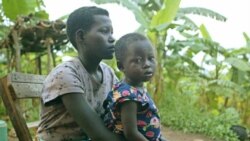This is the VOA Special English Health Report.
Thirty years ago this week, public health officials in the United States reported on the first cases of what came to be known as AIDS. There is growing progress against the epidemic of acquired immunodeficiency syndrome.
But today an estimated sixteen and a half million children have lost one or both parents to AIDS. Most of them live in sub-Saharan Africa. Millions more live with adults who are sick from AIDS.
Lucie Cluver from Oxford University in England has studied AIDS orphans and children living with sick adults in South Africa. She says children can be deeply affected by their experiences.
LUCIE CLUVER: "And one of the biggest impacts we see is mental health, their psychological health. So, for example, we see that AIDS orphaned children have very much higher levels of depression, anxiety and post-traumatic stress disorder than children who have a live parent or children whose parents have died of other causes, including homicide or suicide.”
Lucie Cluver has just written about this problem in the journal Nature. She says children have to live with the stigma, the sense of shame connected to AIDS. Many are bullied at school or excluded from the community.
At home, children living with a sick adult are more likely to live in poverty and face physical and emotional abuse. Also, Lucie Cluver says the children often become the caregivers.
LUCIE CLUVER: “They’re missing school to go and get medication. They’re washing the sick person. They’re often taking them to the toilet, cleaning their wounds or washing their bedclothes. So these kids find it very stressful and upsetting. They’re very worried about the health and feel responsible for the health of the sick person.”
Close contact with sick adults can sometimes spread tuberculosis or other diseases. And, as Lucie Cluver told reporter Art Chimes, even when the children are in school, paying attention can be difficult.
LUCIE CLUVER: "It’s constantly on their minds and really making it difficult for them to do well at school.”
REPORTER: "And the children are telling you this?"
LUCIE CLUVER: "Absolutely, it’s one of the things that they tell us first. It’s one of their greatest concerns."
Her research suggests that psychological problems increase as AIDS orphans get older.
Writing in Nature, she calls for testing more children for tuberculosis. She also calls for giving more parents the drugs needed to keep them healthy longer with HIV, the virus that causes AIDS.
There are programs to help children, but Lucie Cluver says there is "far more to be done." She says interventions such as cognitive behavioral therapy and support groups are "urgently needed" for those orphaned by AIDS or living with sick adults. But the evidence for which interventions are effective "is still thin," she says.
And that’s the VOA Special English Health Report, written by Caty Weaver. I’m Barbara Klein.
Watch a video about AIDS at 30



